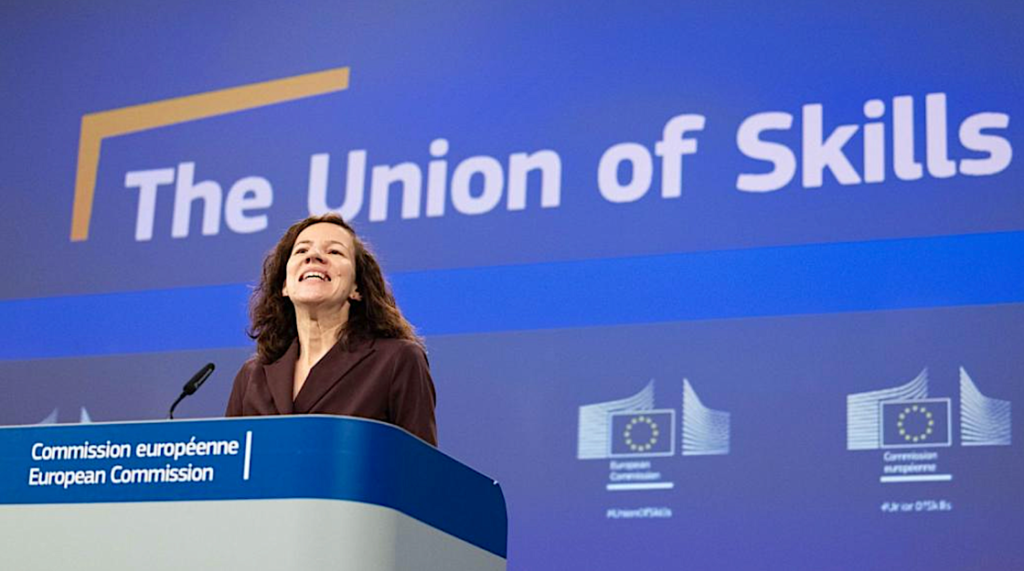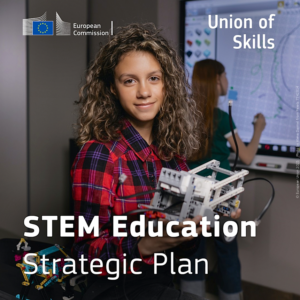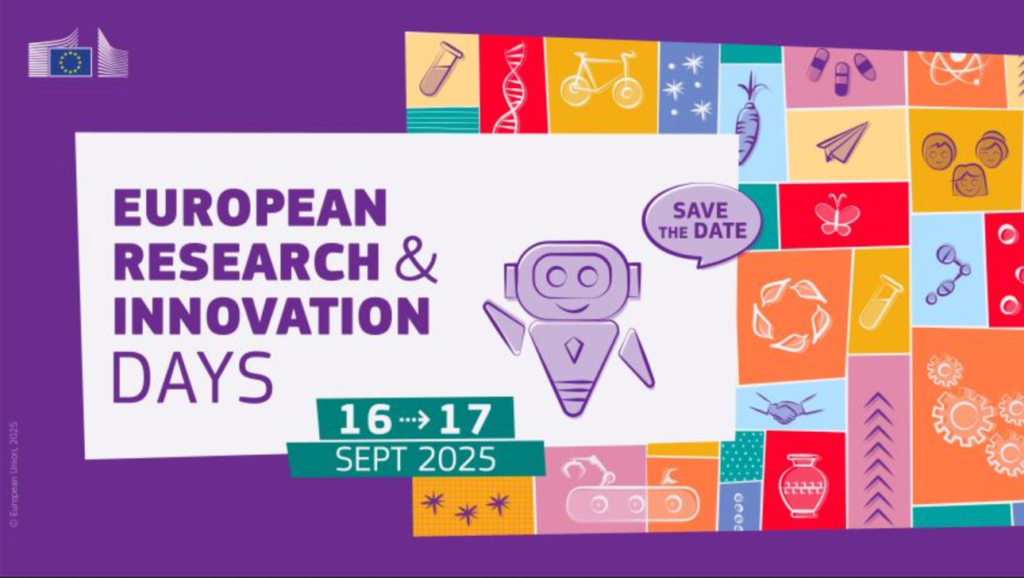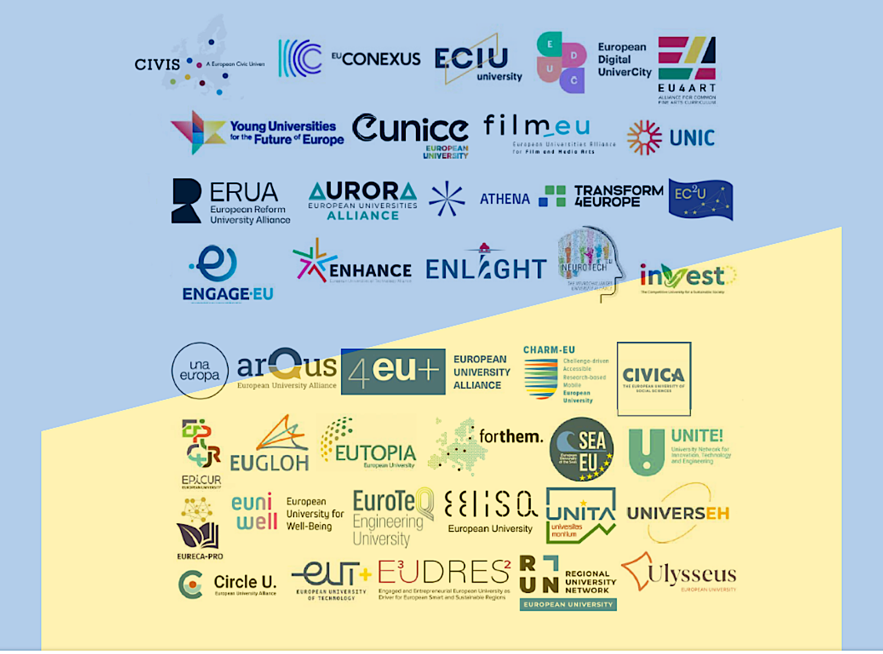AI generated image
‘The future belongs to those who learn more skills and combine them in creative ways’ – Robert Greene.
In a rapidly evolving global economy, skills have become the new currency of competitiveness. As industries transform and technology reshapes the job market, Europe faces a critical challenge: equipping its workforce with the right tools to thrive in the digital and green transitions. At the same time, it must streamline procedures, improve the recognition and equivalence of qualifications across member states, and facilitate workforce mobility to ensure labor can move swiftly to where it is needed most.
The free movement of workers within the European Union was established with the founding of the European Economic Community (EEC) in 1957 under the Treaty of Rome. However, its full implementation occurred in stages, beginning with the six founding members—Belgium, France, Germany, Italy, Luxembourg, and the Netherlands. The principle was further solidified by EEC Regulation 1612/68, which fully guaranteed the free movement of workers, allowing EU citizens to move and work freely across member states without work permits. The Maastricht Treaty (1992) strengthened this freedom by introducing EU citizenship, granting individuals the right to live and work anywhere in the EU, regardless of employment status. At the turn of the 21st century, the EU expanded to include Central and Eastern European countries, broadening labour mobility. By 2011, the EU had achieved full labour mobility across the Union. Today, EU citizens can live, work, and study in any member state without visas or work permits, making free movement one of the cornerstones of the European Single Market.
Despite these developments, disparities and inconsistencies in requirements persist between different countries. While academic degrees are recognised throughout the Union, numerous obstacles remain, hindering full integration and more efficient labour mobility. Moreover, there is now a growing demand for new digital skills—many of which European workers currently lack. To remain competitive, we must equip our workforce with the tools needed to adapt to a rapidly changing environment and meet the real demands of today’s economy.

In September 2024, Mario Draghi – former President of the European Central Bank and Prime Minister of Italy – published The Future of European Competitiveness, a comprehensive analysis of the challenges facing the European Union. Draghi warned of a growing productivity and competitiveness gap between Europe and other major economies, particularly the U.S. and China.
The report stressed that Europe must urgently invest in reskilling and upskilling its workforce to keep pace with technological and industrial advancements. Highlighting the critical role of education reform, Draghi emphasised continuous learning while championing vocational training, STEM education, and digital skills development. He also identified acute shortages of highly skilled workers in strategic sectors such as AI, cybersecurity, engineering, and green technologies.
To address these challenges, Draghi proposed:
– Strengthening collaboration between education systems and industry to align skills with labour market needs
– Increasing funding for R&D and innovation to stimulate high-quality job creation
– Implementing lifelong learning policies to maintain workforce adaptability
– Attracting skilled migration to compensate for Europe’s ageing population
These measures, the report argued, are essential for boosting Europe’s global competitiveness in an increasingly digital and green economy. The report also highlighted another critical challenge: overly complex EU regulations that create barriers for businesses and restrict labour mobility. It called for simplified labour market rules and easier cross-border recognition of qualifications across member states.

Recognising this urgency, the European Commission launched the ‘Union of Skills’ initiative’ on 5 March 2025. Vice-President Roxana Minzatu unveiled this flagship project—a comprehensive skills development strategy designed to tackle Europe’s skills shortages, foster innovation and enhance the EU’s global competitiveness.
This groundbreaking initiative aims to bridge the skills gap, support innovation, and prepare workers for tomorrow’s jobs. By creating a more agile and adaptable workforce, the EU seeks to drive economic growth and strengthen Europe’s position in the global marketplace. Beyond education, the strategy focuses on economic resilience and strategic autonomy, forming a key pillar of the EU’s broader competitiveness agenda. Its goal? To equip Europeans with future-proof skills for the digital, green, and industrial transitions.
Among other measures, the plan includes introducing a Basic Skills Support Scheme aimed at strengthening core competencies—reading, mathematics, science, and digital literacy—for both young people and adults. ‘We need new skills for the future,’ stressed Roxana Minzatu, Vice-President of the EU Commission, during her speech at the EU Social Forum in Brussels. ‘We must understand the new skills ecosystem, invest more, and target funding more effectively.’ At the Forum, Minzatu also emphasised the need for tighter collaboration between education institutions, the public sector, and private enterprises. She highlighted the importance of developing forecasting tools to anticipate industry needs in a timely manner.
One pressing issue is the alarming gap in basic maths skills among school leavers, severely restricting their employability and adaptability in today’s fast-evolving job market. Compounding this, fewer students are choosing technical training or STEM degrees—a trend the Commission aims to reverse through its STEM Education Strategic Plan. Key objectives of the plan include modernising STEM curricula to reflect industry demands, fostering partnerships between schools, universities, and businesses and encouraging greater participation of women and underrepresented groups in STEM careers. The plan includes initiatives to modernise STEM curricula and establish stronger links between educational institutions and industries.

At the European Employment and Social Rights Forum in Brussels, discussions largely focused on tackling Europe’s skills and labour challenges to boost competitiveness and social inclusion. Among other speakers, Mario Nava, Director-General at DG Employment, Social Affairs and Inclusion, stressed the need to promote sustainable prosperity and equip workers with adaptable skills to keep pace with rapid workforce changes. Topics ranged from AI’s role in labour markets to social innovation programs designed to close skills gaps.
Chuck Robbins, CEO of Cisco, provided concrete insights into implementing the Union of Skills initiative, reiterating the critical role of public-private partnerships in tackling shortages: ‘Only 7% of companies in Europe say they are ready for the transition to the digital age. We need to reduce digital illiteracy. Over the past 20 years, Cisco’ Network Academy offered digitalisation training to 20 million students. Cisco is committing today to additionally train in Europe 1.5 million students and 5,000 instructors by 2030. Digital skills are ever more relevant. Beyond a certain age, it is more difficult, but we don’t want to leave anyone behind.’
The discussions also focused on enhancing adult learning and the growing imperative for continuous upskilling in today’s fast-evolving labour market. As part of the Union of Skills initiative, the EU plans to revitalise vocational education and training (VET). The new VET strategy aims to make vocational careers more attractive and innovative, strengthen business-education partnerships to align training with labour market demands and expand financial and structural support for apprenticeships and dual education systems. Lifelong learning remains a cornerstone of the plan. The Commission will promote micro-credentials—short, flexible learning modules—to help workers acquire and certify new skills efficiently. ‘The Pact for Skills, already driving skills development in key sectors, will be reinforced to offer more training opportunities and funding for workers,’ stated the EU Commission. Crucially, these qualifications must be recognised EU-wide, enabling professionals to move seamlessly across borders. This would reduce bureaucratic hurdles, tackle labour shortages faster, and better match skills with industry needs.

Adult learning participation serves as a critical benchmark for assessing upskilling progress and labour market adaptability across the EU. Recent data from the Adult Learning Survey reveals that 39.5% of adults participated in formal or non-formal learning (excluding on-the-job training) in 2022 – a positive trend, yet still far below the EU’s 2030 target of 60%. Notably, participation rates vary significantly between Member States, with higher-educated individuals being substantially more likely to engage in lifelong learning. (Source: EU Monitor). A study by Cedefop highlights the scale of the challenge: approximately 128 million EU adults (46.1%) require upskilling or reskilling. This assessment considers low formal education levels, inadequate digital competencies and employment in elementary occupations. Again, national disparities are stark – while Malta and Portugal report needs affecting approximately 70% of adults, the figure falls to about 28% in the Czech Republic and Finland. (Source: jobmarketmonitor.com).
The EU has introduced targeted measures to support workers requiring urgent retraining. Between 2021 and 2022, approximately 13,000 displaced workers received assistance through retraining programmes and job placement support. A pressing concern remains youth unemployment, driven by either skills mismatches or outdated qualifications. As of December 2024, the EU’s youth unemployment rate stood at 15%, though with considerable national variations. Spain recorded a rate of 25.3% in January 2025. While still 11 percentage points above the EU average, this reflected notable progress compared to previous years (Source: Eurostat).
The European Union is actively working to attract top international researchers, engineers, and scientists through initiatives like ‘Choose Europe’ (part of the Marie Skłodowska-Curie Actions). With a €22.5 million budget, the program aims to strengthen collaboration between European universities and research institutions, as well as offering competitive salaries, funding, and career development to retain talent. The need is urgent: 4 out of 10 European SMEs struggle to find qualified employees. Interestingly, recent reports suggest growing interest among US-based academics—particularly due to political uncertainties—in relocating to Europe. While outcomes remain uncertain, this could present a strategic opportunity for the EU.

The Union of Skills initiative directly supports the EU’s 2040 competitiveness strategy, with three core objectives. Reducing critical skills shortages, strengthening Europe’s resilience against economic and technological disruptions, and empowering workers to transition between careers throughout their working lives. While the digital revolution will inevitably displace many current jobs, it will simultaneously create new, unforeseen opportunities – some in roles we can’t yet imagine. The real challenge lies in implementation and funding within Europe’s current economic landscape. The Commission plans to support the initiative through a mixed financing model, combining public funding and private sector investment.
The initiative focuses on two key financial strategies: streamlining public funding to enhance the effectiveness of education and training programmes, and boosting private investment through improved incentives and regulatory conditions. A prime example of this approach in action is the network of European University Alliances, which successfully combines public and private resources to drive innovation in higher education.
The Union of Skills initiative adopts a dual-phase approach, combining urgent actions with visionary 2030 targets. EU Executive Vice-President Roxana Minzatu (Social Rights and Skills, Quality Jobs and Preparedness) launched it within her first 100 days – a deliberate signal of its top-tier political priority. Immediate actions include pilot programmes like the Basic Skills Support Scheme, implementation of the Skills Guarantee, rapid upskilling in fundamental competencies and expansion of lifelong learning pathways.

In the longer term, strategic goals have been set for 2030. These include systemic education reforms, sustainable employability improvements and pan-European skills intelligence integration. To ensure effective execution, the Commission will establish a European Skills High-Level Board (strategic oversight) and a European Skills Intelligence Observatory (data-driven monitoring). This multi-layered governance model enables real-time policy adaptation while maintaining long-term strategic alignment.
The world is evolving towards greater competition and individualism, with growing scepticism about globalisation’s benefits. We’re witnessing rising resistance to free trade principles and new barriers to sharing technological advancements. In this climate of fragmentation, Europe faces an urgent imperative: to adapt swiftly to these emerging realities while preparing for future challenges. Our ability to remain agile will determine our success in the coming decade.
‘Education is the most powerful weapon which you can use to change the world.’ – Nelson Mandela.
alexandra.paucescu@europe-diplomatic.eu

